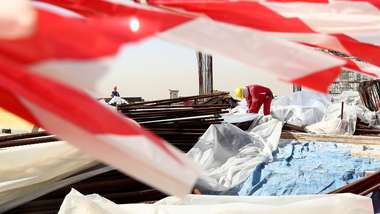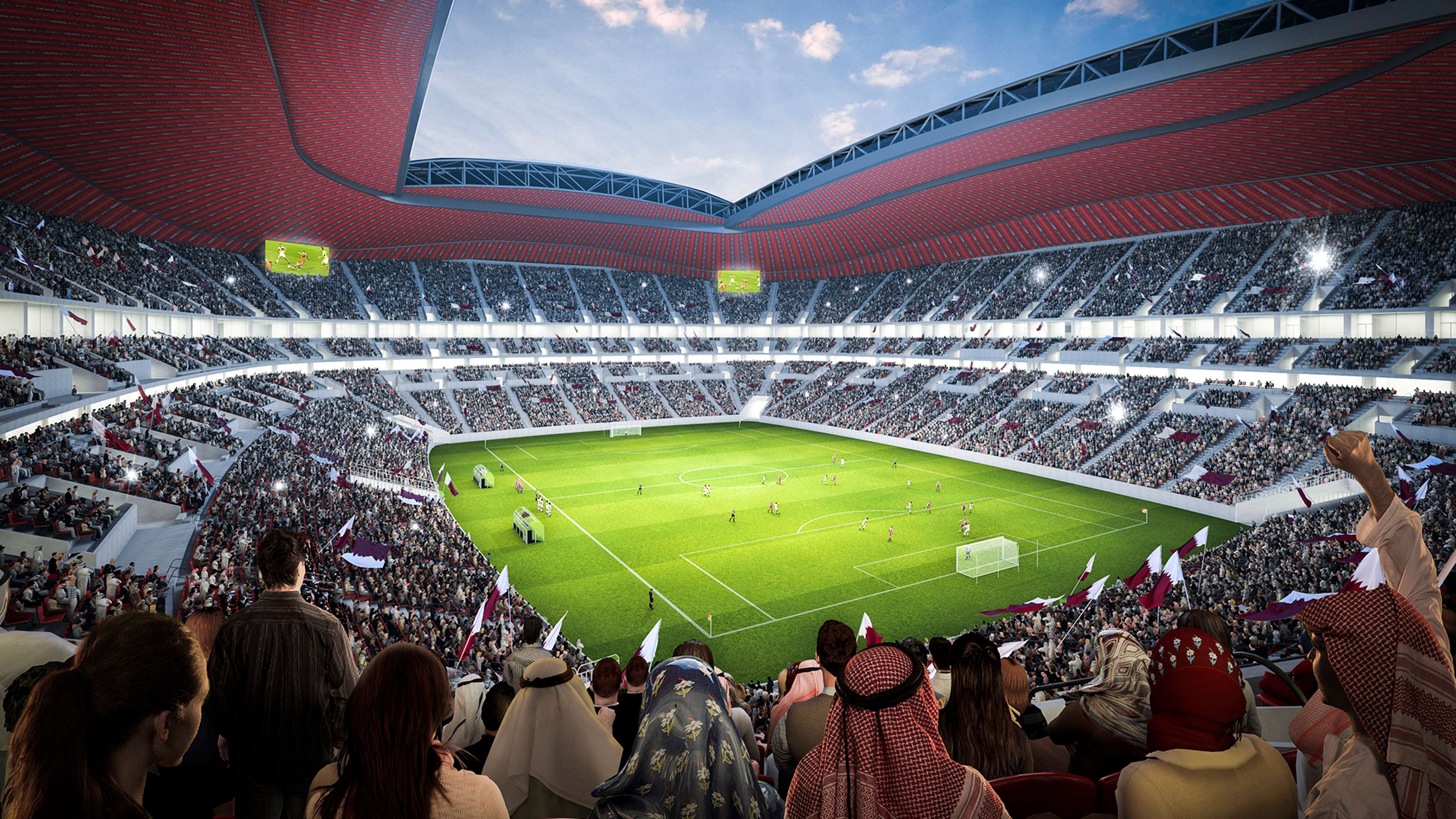In less than four years' time, the Qatar World Cup will be under way in 2022, and the road to the tournament has been riddled with controversy and criticism.
It will be the first time that the World Cup will be hosted in the Middle East, and concerns regarding to the weather and rescheduling of the tournament to better suit the climate conditions barely scratch the service.
Goal brings you all the information about what you need to know ahead of the 2022 World Cup.
Where is the 2022 World Cup?
The 2022 World Cup will be held in Qatar, despite controversy surrounding the host country following FIFA's shock decision to award it the tournament in 2010.
Qatar will become the first Middle Eastern country to host the World Cup, and it has been far from smooth sailing for both FIFA and the host nation ever since landing the bid. Major developments and redevelopment of stadiums are required between now and 2022, as well as a rescheduling of the entire tournament to be moved from the summer to the winter.
Initial plans involved Qatar hosting games across 12 stadiums, but it has been reported that the number of venues will be reduced to eight.
Only the 40,000-seater Khalifa International Stadium, located eight miles from Doha, is open to the public, and will host the World Athletics Championships next year.
The other seven stadiums are still currently under construction and are expected to finish work by 2020.
Organisers have stated that total budget for the stadiums and training complexes is an extortionate £5bn ($6.5bn), with concerns raised about the treatment of migrant workers in building the new stadiums as well as human rights organisations denouncing the labour practices.
When is the 2022 World Cup taking place?
The 2022 World Cup will be the first tournament not to take place in the summer months of June and July and will instead be held during the winter to remain in-keeping with Qatar's cooler temperatures.
Qatar experience swelteringly hot summers with temperatures reaching highs of 42°C in June, July and August.
FIFA have moved the World Cup to the cooler months of November and December, though the weather will still be rather warm – the average high being 30°C and dipping to a low of 23°C in December.
The 2022 World Cup will then begin on November 21 and conclude just under a month later on December 18.
The decision to move the World Cup to the winter season has inevitably drawn criticism from a number of European associations. The majority of European leagues are in operation throughout November and December, and their leagues would be interrupted with a number of their players leaving to participate in the winter tournament.
The Premier League have stated that the 2022 World Cup was "neither workable nor desirable for European domestic football", and though they already announced plans to introduce a festive period break with a view ahead to Qatar, the rescheduling will still cause great ramifications.
A World Cup held in the winter will also force the postponement of the 2023 Africa Cup of Nations, though the tournament may be then moved to the summer months, following in the footsteps of the 2019 edition.
Additionally, a winter World Cup avoids clashing with the Winter Olympics (February) as well as Ramadan (April).
When will the draw for the 2022 World Cup be made?
For World Cup tournaments held in the summer, the draw usually takes place in the December that precedes the year of the tournament.
As the Qatar competition will take place in winter, however, the draw for the 2022 finals will be confirmed earlier that year in April, six months before kick-off.
What teams will participate in the 2022 World Cup?
 Getty
Qatar are the only country who have been confirmed as a participating team for the 2022 World Cup.
Getty
Qatar are the only country who have been confirmed as a participating team for the 2022 World Cup.
A total of 32 teams (including Qatar) will take part in the 2022 finals, and will be the last tournament involving 32 nations after the expansion of the competition for future editions.
The qualification process for the tournament has not yet been announced by FIFA. They have confirmed, however, that the allocation of slots will be the same for every World Cup edition since 2006. CAF (Africa) will receive five allocations, AFC (Asia) receiving four (not including the host nation), UEFA (Europe) receiving 13, CONCACAF (North and Central America and Caribbean) having three or four, OFC (Oceania) having a maximum of one, and CONMEBOL (South America) receiving four of five.
The qualification stages are expected to begin in June 2019 and conclude in November 2021, should they follow in the tradition of taking place in the September three years prior before the finals and ending on the October the year before it.
They could be given a major change due to accommodating the new UEFA Nations League, however.
How can fans buy tickets for the 2022 World Cup?
Fans will need to wait until 2021 to be in with a chance of purchasing tickets to attend the 2022 World Cup, and FIFA are expected to announce a similar scheme to the Fan ID initiative that was used in the Russia finals, which provided visa-free entry into the country.
World Cup finals tickets will be sold exclusively through FIFA, and typically go on sale less than a year before the start of the tournament – so check back in 2021!
Why has Qatar's World Cup bid been so controversial?
The controversy surrounding rescheduling of the tournament from summer to winter is only the tip of the iceberg when it comes to Qatar 2022, with the bid having been criticised for a multitude of reasons – including severe human rights violations, allegations of bribery, and the harsh Qatari laws.

Bribery charges
Accusations of corruption have been made and speculated upon regarding how Qatar won the right to host the 2022 World Cup after beating out the likes of the United States, Australia and Japan.
Qatar has always denied the allegations of bribery, and FIFA subsequently launched an independent investigation into the case that was led by American lawyer Michael Garcia.
Garcia later left his post as the federation's ethics investigator due to a "lack of leadership" within the organisation, however, though he published a partially censored version of his report that cleared Qatar of any wrongdoing.
Despite this, FIFA's awarding the bid to Qatar has been criticised by many as part of the FIFA corruption scandals. Others have raised concerns about awarding the World Cup to a nation that needs to essentially build for the entire tournament, instead of awarding it to a country who already have the established infrastructure.
Poor working conditions
A big point of controversy has been the poor treatment regarding labourers working on the infrastructure for Qatar 2022.
The Qatari government has been accused of breaching human rights violations amid the poor living and working conditions of their workers, and Amnesty International have stated that little has been done to improve the lives of the labourers.
"Ever since Qatar was awarded hosting rights we've been pressing the authorities to clean up their act over the exploitation of migrant workers," said Allan Hogarth, Amnesty International's head of policy and government affairs.
"Promised reforms have been slow in coming and we remain concerned that 2022 will arrive and Qatar's hundreds of thousands of foreign workers will still be facing exploitation and poor working and living conditions."
Amnesty International said in September 2018 that dozens of migrant labourers working in the city have gone for several months without pay, though FIFA president Gianni Infantini stated that the World Cup will "leave a great legacy".
"On the social side, it has had a very important social impact in the whole region," he added.
"When you think about all the debates on human rights and workers' welfare... without the World Cup, these debates would not have happened and the improvements which happened would not have happened either."
The World Cup organisers said: "The health and wellbeing of our workers is our top priority. There are currently more than 30,000 workers on our sites.
"The SC [Qatar's supreme committee for delivery and legacy]'s worker welfare standards cover ethical recruitment, accommodation and working conditions. Regular audits support compliance, while contractors in breach of the standards are subject to enforcement measures, including contract termination and blacklisting."
Qatari laws
Another huge point of criticism regarding Qatar's hosting of the World Cup are their strict laws regarding homosexuality, and their rules surrounding the LGBT community.
Despite homosexuality being illegal in Qatar, the SC have stated that "everyone will become welcome in 2022" – though it is uncertain how their laws will be applied to LGBT fans wishing to attend the tournament.
An SC spokesperson said: "Qatar has hosted numerous major international sporting events where every fan has felt welcome and safe. The World Cup will be no different."
Additionally, drinking in public in Qatar is illegal, but the country's government has stated that alcohol consumption will be allowed in hotels and other "designated areas" such as fan parks.
